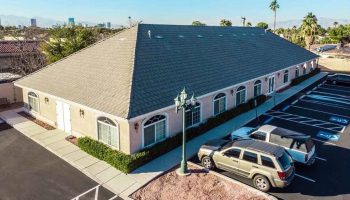Las Vegas Paiute Tribe Health and Human Services
About Las Vegas Paiute Tribe Health and Human Services
In Las Vegas, Nevada, the Las Vegas Paiute Tribe Health and Human Services helps residents fight mental health and substance abuse. They’re a community hub deeply committed to providing culturally sensitive and holistic care. They primarily focus on Native American Tribes. They also welcome other Las Vegas residents by offering flexible payment options.
Real Care in Las Vegas
This facility stands out with programs that go far beyond the typical. Their Special Diabetes Program for Indians is an evidence-based effort to combat high diabetes rates within Native American and Alaska Native communities. This shows a real commitment to specific community health needs.
Their behavioral health department is also exceptionally strong, offering a wide array of therapies. The facility offers cognitive (CBT) and dialectical behavior therapy (DBT), and motivational interviewing. Crucially and specialized support for individuals managing HIV/AIDS or navigating trauma.
Charting Your Comeback
Where this center truly shines is that they have both medically supervised detoxification and really solid medication-assisted treatment (MAT) programs in place. Their MAT uses crucial medications like buprenorphine (including buprenorphine with naloxone) and sometimes oral naltrexone. These help folks stay on track by dialing down cravings and making withdrawal symptoms easier to manage.
Their Patient Benefits Coordinator offers practical, hands-on assistance to help individuals navigate the often-confusing maze of applying for Medicaid, Medicare, or private insurance. It’s this combination of advanced medical care and compassion that makes the Las Vegas Paiute Tribe Health and Human Services a valued local resource.
| Levels of Care | Detox Service Setting | Programs | Payment Options | Medications Offered |
|---|---|---|---|---|
|
In outpatient therapy, you’ll attend therapy sessions several times each week while living at home. This is ideal if you have a strong support system and a lower risk of relapse. Outpatient treatment offers flexibility to maintain work, school or family obligations. |
Aftercare programs provide ongoing support after you complete a rehab program. They may include several components to help you maintain sobriety including therapy, community support groups and relapse prevention strategies. This gives you a network of resources as you reintegrate into your daily life. |
|||
|
Outpatient detox gives you access to medically supervised withdrawal services while still allowing you to live at home. You’ll attend a clinic for treatment and monitoring. This flexible option is suitable for those with mild to moderate withdrawal symptoms who have strong support systems. |
Medication assisted treatment combines medication and counseling to manage withdrawal and reduce cravings for opioid and alcohol addiction. Medications may include methadone, buprenorphine or naltrexone. MAT is tailored to your needs so you can actively participate in your treatment journey. |
|||
|
Teen (13 - 18)
|
Young adult programs are designed for individuals who are transitioning into adulthood. Topics of discussion typically include identity, independence and peer relationships. Providers may also offer life skills training and career support. |
Women's programs offer a safe and supportive space to focus on gender specific issues such as trauma, family roles and mental health conditions. Therapists tailor the sessions to address women's needs and foster empowerment in a healing and nurturing environment. |
Men's programs address substance use while also considering the social pressures, family roles and mental health concerns that are specific to men. You’ll learn healthy coping mechanisms as you build emotional resilience and develop communication skills. |
|
|
Medicare
|
Medicaid
|
Self Pay
|
||
|
Buprenorphine
|
Levels of Care
In outpatient therapy, you’ll attend therapy sessions several times each week while living at home. This is ideal if you have a strong support system and a lower risk of relapse. Outpatient treatment offers flexibility to maintain work, school or family obligations.
Aftercare programs provide ongoing support after you complete a rehab program. They may include several components to help you maintain sobriety including therapy, community support groups and relapse prevention strategies. This gives you a network of resources as you reintegrate into your daily life.
Detox Service Setting
Outpatient detox gives you access to medically supervised withdrawal services while still allowing you to live at home. You’ll attend a clinic for treatment and monitoring. This flexible option is suitable for those with mild to moderate withdrawal symptoms who have strong support systems.
Medication assisted treatment combines medication and counseling to manage withdrawal and reduce cravings for opioid and alcohol addiction. Medications may include methadone, buprenorphine or naltrexone. MAT is tailored to your needs so you can actively participate in your treatment journey.
Programs
Young adult programs are designed for individuals who are transitioning into adulthood. Topics of discussion typically include identity, independence and peer relationships. Providers may also offer life skills training and career support.
Women's programs offer a safe and supportive space to focus on gender specific issues such as trauma, family roles and mental health conditions. Therapists tailor the sessions to address women's needs and foster empowerment in a healing and nurturing environment.
Men's programs address substance use while also considering the social pressures, family roles and mental health concerns that are specific to men. You’ll learn healthy coping mechanisms as you build emotional resilience and develop communication skills.
Medications Offered
Amenities
Accreditations
Contact
- Monday 8AM - 5PM
- Tuesday 8AM - 5PM
- Wednesday 8AM - 5PM
- Thursday 8AM - 5PM
- Friday 8AM - 5PM
- Saturday Closed
- Sunday Closed

Ruben Vasquez is drawn to projects that start with a question and end with something useful—whether it’s writing about DIY builds, small-scale farming, or using homegrown food to support real healing. He has hands-on experience with microgreens, hydroponics, worm composting, and building businesses from the ground up.
He loves diving into unfamiliar territory, learning as he goes, and turning what he learns into clear, practical writing. Whether it’s explaining tough topics, making things more approachable, or adding a little humor along the way, Ruben brings a grounded, curious energy to every project—especially ones rooted in health, sustainability, and self-reliance.

Peter W.Y. Lee is a historian with a focus in American Cold War culture. He has examined how popular culture has served as a coping mechanism for the challenges and changes impacting American society throughout the twentieth century.




